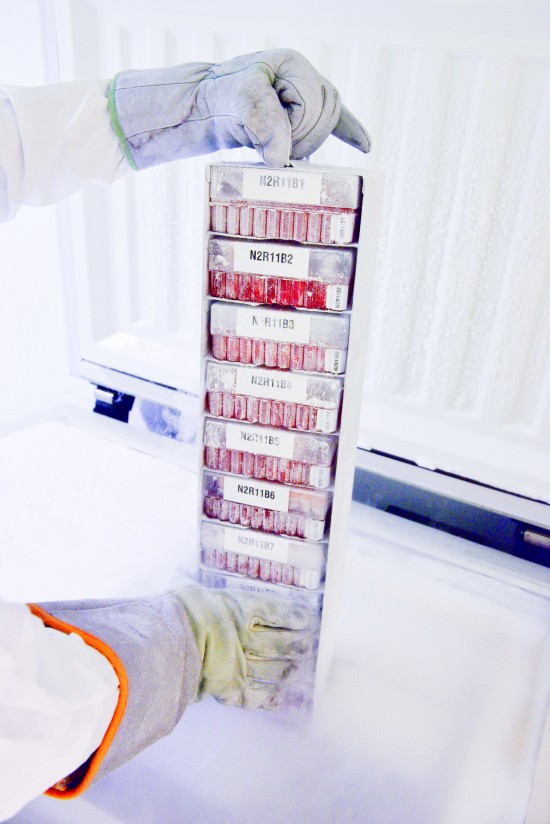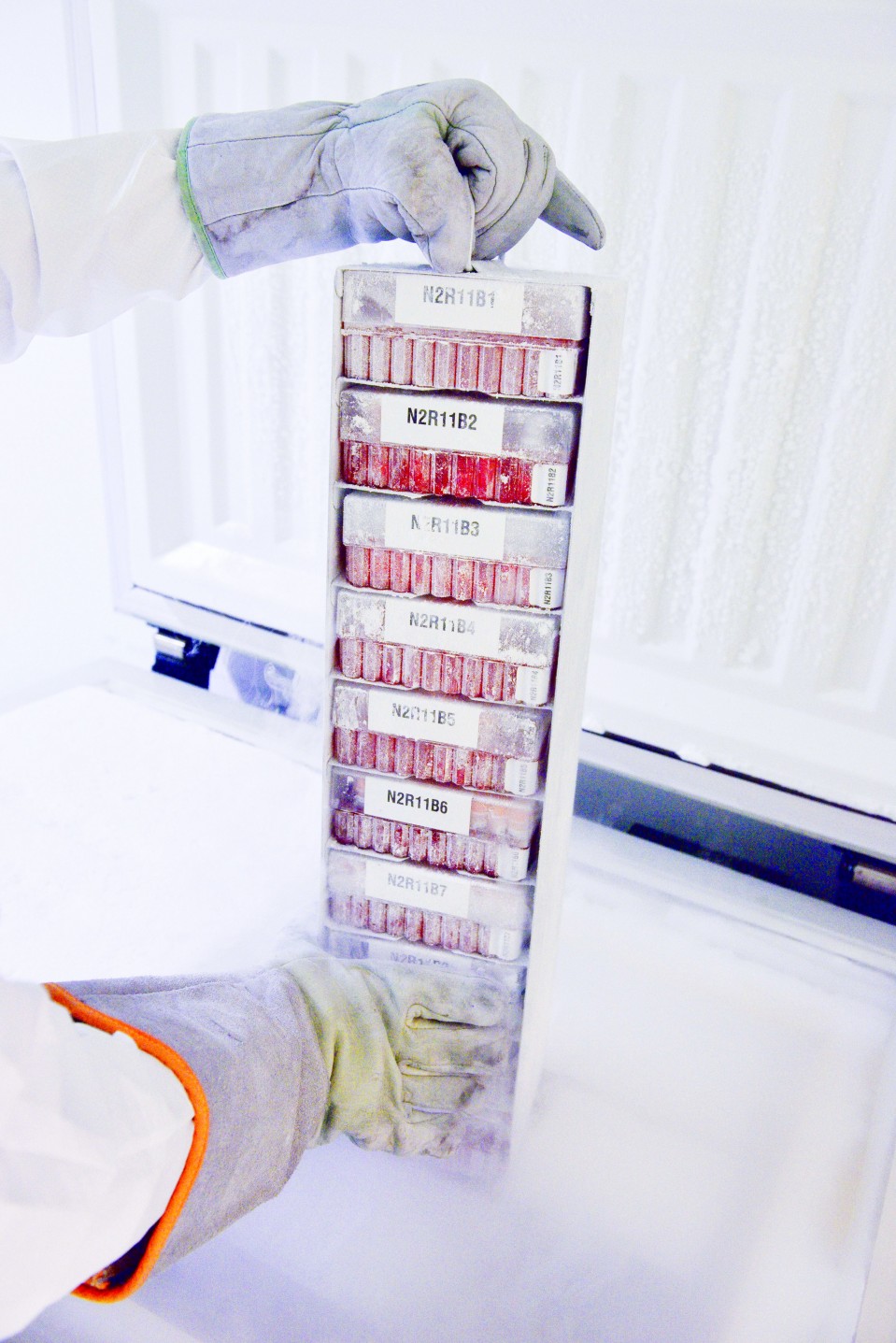Rewriting Life
Patient Death Won’t Slow Research on “Off-the-Shelf” Immune Cells to Treat Cancer
The approach could treat patients in dire need faster at a lower price, but questions remain about safety.



A breakthrough therapy that uses genetically altered immune cells to treat an often-fatal type of childhood blood cancer passed an important milestone in August when the U.S. Food and Drug Administration approved it. The highly personalized treatment, called CAR-T therapy, uses a patient’s own immune cells and takes about three weeks to manufacture—two factors that lend to its $475,000 price tag.
Similar therapies are in the pipeline, but the cost and time it takes to make each dose could put these life-saving treatments out of reach for patients who desperately need them. To address these issues, academic and commercial labs are already working on a newer approach—one that uses immune cells from a healthy donor instead of the patient. The idea is that these treatments could be manufactured in bulk and be readily available whenever a patient needs them. And one donor sample could hypothetically make a dozen—or even hundreds—of doses.
“It’s a very attractive concept,” says Bruce Levine, a professor of cancer gene therapy at the University of Pennsylvania’s Perelman School of Medicine who helped develop CAR-T cells. “Clearly, there are patients in need from whom we cannot generate adequate cells.”
Dubbed “off-the-shelf” immune cells, these therapies have problems of their own. The FDA this week halted two clinical trials of an off-the-shelf therapy developed by French biotech firm Cellectis after a 78-year-old patient died. The company is still investigating the death, and CEO André Choulika says he isn’t discouraged by the setback. But the tragedy underscores that these therapies aren’t yet ready for prime time, despite their potential benefits over personalized CAR-T therapies.
Personalized CAR-T therapies, like the one marketed by Novartis that was approved by the FDA, are made using a patient’s own T cells, a type of immune cell. The patient’s T cells are removed and genetically altered to contain a new gene that codes for a protein—known as a chimeric antigen receptor, or CAR. This protein tells a patient’s T cells to seek out and kill cancer cells that have a specific marker on their surface. The modified cells are then infused back into the patient (see “10 Breakthrough Technologies 2016: Immune Engineering”).
The therapy relies on the patient already having enough immune cells to work with, but that’s not the case for all cancer patients. Prior treatment with chemotherapy can deplete these cells. Some patients’ cells might not be healthy enough for the procedure, and infants also don’t yet have enough immune cells in their body.
Even when scientists are able to extract enough cells from patients, the manufacturing process doesn’t always work. The weeks-long wait time also means that patients with rapidly progressing cancers may die before they can get treated. In two of Novartis’s clinical trials for its approved drug Kymriah, a total of 123 patients were enrolled, but 10 patients died before receiving the therapy, according to data the company presented at a July FDA meeting. For another nine patients, scientists weren’t able to manufacture the therapy.
Isaac Ciechanover, CEO and president of Atara Biotherapeutics, which is developing off-the-shelf immune cell therapies for cancer, says having cells on hand is an advantage for very sick patients. “You don’t know what kind of patient is going to walk through the door,” he says. “Being able to have a breadth of cells available to patients within days of need is essential.”
Cellectis thinks it can treat these patients with its off-the-shelf or “universal” T cells. Its manufacturing process is similar to traditional CAR-T therapies, except the company uses donor cells and adds an extra step when the cells are being modified outside the body. The company uses a gene-editing method called TALENs to delete the receptor that T cells normally use to detect invading molecules.
Choulika says this is necessary because you can’t just inject someone’s cells into another person. The donated immune cells may recognize the body’s cells as foreign and attack them. “Normally a T cell is supposed to make a survey inside the body for any intrusion from the outside,” he says. By removing that T cell receptor, the donor cells hopefully won’t launch an assault on the recipient's cells, which has been a major concern with off-the-shelf therapies.
This wasn’t the case with the patient who died in the Cellectis study, but he did develop other severe side effects previously seen in CAR-T studies. The only other patient treated with the therapy so far, a 58-year-old woman, experienced similar but less severe side effects.
“It’s a tragedy that this patient passed away but it’s actually an indication that the therapy may work,” Levine says. “If it didn’t there wouldn’t be this reaction.”
The FDA has put the trials on hold and Choulika says he's not yet sure when they will be able to resume, but he says the company is investigating the cause of the patient’s death. One possible explanation is that the T cells from healthy patients may be more potent than ones from sick patients, he says.
A safety monitoring board has recommended lowering the dose, which was already lower than the amount given in personalized CAR-T trials. Figuring out the right dose of off-the-shelf cells for patients will be a major obstacle for researchers developing these therapies.
Meanwhile, other groups are working on different off-the-shelf approaches. Novartis has shown interest in off-the-shelf therapies, and Kite Pharma, recently acquired by Gilead for $11.9 billion, is pursuing the idea.
San Diego-based Fate Therapeutics has partnered with Michel Sadelain at Memorial Sloan Kettering Cancer Center to develop off-the-shelf CAR-T cells derived from induced pluripotent stem cells—cells derived from blood or skin that are reprogrammed to an embryonic-like state. These stem cell cells have the ability to turn into any type of specialized cell in the body, including immune cells. Fate Therapeutics CEO Scott Wolchko says the idea is to grow healthy T cells from a single line of stem cells, which could then be cloned and expanded whenever needed.
Stem-cell-derived immune cells may be several years from clinical trials, though. Induced-pluripotent stem cells can cause tumors, and only limited testing of these therapies has been done in people. The FDA has not yet approved a stem cell-based therapy.
Yet another approach that is moving into clinical trials soon uses a different type of immune cell, known as natural killer cells. Katy Rezvani, professor of stem-cell transplantation and cellular therapy at MD Anderson Cancer Center, is extracting these cells from donor cord blood and engineering them to act like CAR-T cells to fight cancer. She says this method could be far less expensive than personalized CAR-T therapies.
“I envisage that we will be able to make multiple products from one unit and we could freeze them so we could have those ready to go for patients,” Rezvani says.
But until these new therapies are tested in more patients, scientists don’t yet know if they’ll work as well as personalized CAR-T therapies.